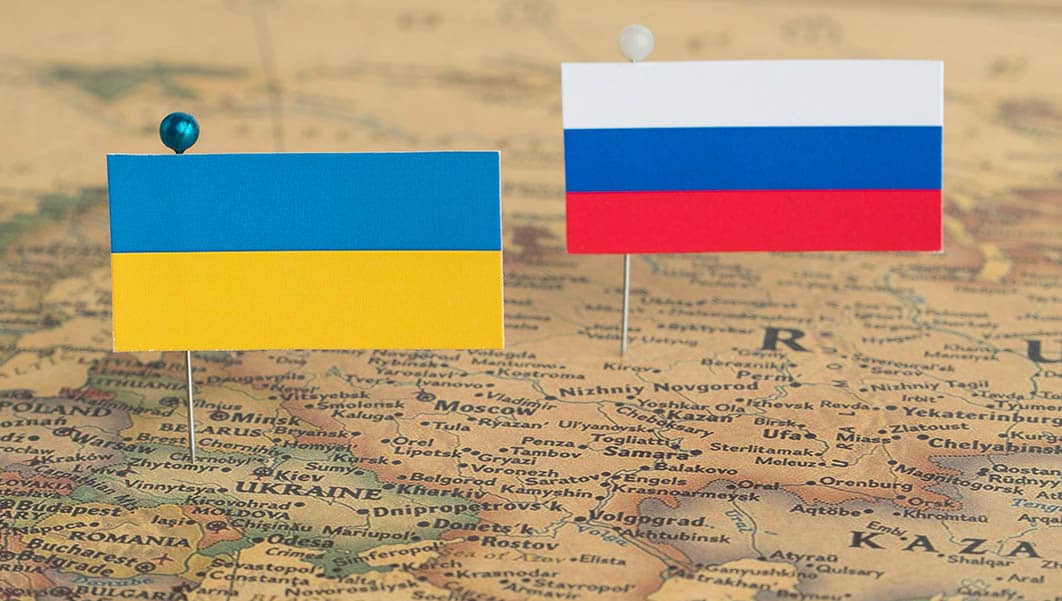Euro Hit by Russia-Ukraine Fears, but some say Weakness Won't Last
- Written by: Gary Howes
-
- Geopolitics dog the Euro
- As U.S. warns of Russian invasion of Ukraine
- Some market analysts see a Euro rebound
- On assumption tensions will ultimately fade

Image © Adobe Stock.
The Euro has fallen significantly against major peers amongst a ratcheting up of tensions in Eastern Europe, however some strategists remain circumspect and tell clients the Euro will ultimately recover its losses on an assumption Russia will pull back from the brink.
Stock markets and the Euro fell at the start of the week as investors took steps to position for a potential armed conflict in Ukraine.
European markets lead global peers lower after the U.S. warned on Friday of the "very distinct possibility" of a Russian invasion of Ukraine in the next few days, potentially involving an overwhelming attack on Kyiv.
The European Union depends on Russia for 40% of its gas imports and 30% of its oil imports, explaining the Euro's sensitivities to conflict in the region.
A war could significantly undermine the supply of oil and gas supplies to Europe, thereby heaping economic pressure on the economy and encourage the European Central Bank (ECB) to maintain monetary support for longer.
The Pound to Euro exchange rate surged three-quarters of a percent on Friday when the U.S. warnings of invasion were initially accounted for by foreign exchange markets.
Further losses by the Euro have seen GBP/EUR extend further to 1.1944 on Monday.
- Reference rates at publication:
GBP to EUR: 1.1945 - High street bank rates (indicative): 1.1630 - 1.1711
- Payment specialist rates (indicative: 1.1837 - 1.1885
- Find out more about specialist rates and service, here
- Set up an exchange rate alert, here
The Euro to Dollar exchange rate fell 0.70% on Friday and added a further half percent decline at the start of the new week to go to 1.1307.
As long as tensions surrounding Ukraine and Russia continue the Euro will likely be pressured.
"Diplomatic talk on the highest levels between Russia and US/UK/EU/NATO continues but positions stay looked with Scholtz trying his luck with Putin tomorrow. It is of course impossible to know what Putin will do. Still, an invasion when Olympics have ended next weekend is clearly on the table, suggesting risk appetite for euro and euro will stay low," says a strategy note from Swedbank.
But some foreign exchange strategists say any easing in tensions could result in a recovery in global sentiment, and the Euro.
"In our central scenario, we still think diplomatic efforts will eventually lead to a dialling down of tensions. This may take several months, during which the possibility of flare-ups like the one we are experiencing today remains elevated," says Mark Haefele, Chief Investment Officer Global Wealth Management, at UBS AG.
Media are reporting Monday the Kremlin has said Ukraine renouncing its intention to become a Nato member would significantly help address Russian security, suggesting a potential point of compromise that can allow Russia to step back.
Vladimir Putin's spokesperson Dmitry Peskov was responding to comments given to the BBC by Ukraine's ambassador to the UK yesterday, which suggested Ukraine could drop its bid to join Nato to avoid war with Russia.
"Assuming Russia will not go for a full-scale invasion of Ukraine, omicron restrictions gradually being lifted in eurozone and ECB in March confirming a first hike in Q4, and US inflation peaking in March/April, EURUSD should remain a buy on dips," says Swedbank.
However, Moscow said it did not believe there had been an official change in Kyiv’s position despite remarks made by Ukraine’s ambassador to Britain.
{wbamp-hide start}
{wbamp-hide end}{wbamp-show start}{wbamp-show end}
Russia meanwhile on Monday committed to further talks with Western nations.
Foreign minister Sergei Lavrov told President Vladimir Putin in a televised meeting that talks should continue as "there’s always a chance," of progress.
Expecting tensions to ease, foreign exchange strategists at Barclays are buyers of the Euro, anticipating multi-week recovery in response to the ECB's recent signal that it could consider raising interest rates in 2022.
"We view this as the consolidation before the rally," says Marek Raczko, an analyst at Barclays.
Barclays' analysts note ECB members are now talking about policy normalisation after a decade of ECB policy being biased to protect against deflation.
The ECB has officially acknowledged "upside" inflation risks and set out a policy path to normalising rates.
"This is a seismic shift in the ECB's reaction function and it will take several months for FX markets to adjust," says Raczko.
Barclays are buyers of the Euro, targeting a rally in Euro-Dollar to 1.20.
If geopolitical tensions fade and investors return focus to central bank policy then Euro exchange rates could snap back to recent highs.
